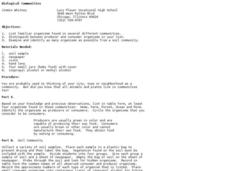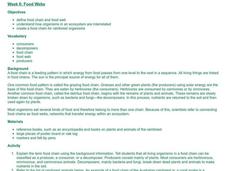Council for Economic Education
I'll Trade You a Bag of Chips, Two Cookies, and $60,000 for Your Tuna Fish Sandwich
If you are looking for a great lesson on supply, demand, market price, demand curves, and data analysis look no further. With glossary definitions, activities, and web lined resources this lesson is a winner.
Curated OER
Fast Food Tomatoes
Here is a fantastic reading passage and discussion question to challenge your advanced learners. They read a passage describing arguments against the mass production of tomatoes for fast food resulting in poor treatment of workers. Then...
Science Matters
Matter Cycles — Sum It Up
Scholars become part of the cycle of matter with a reader's theater that showcases producers, consumers, decomposers, and the sun. A diagram and discussion concludes the learning experience and enhances comprehension.
Oxfam
Sweatshops - Exploitation Is Never in Fashion
Here's a resource that brings home the idea that we are all part of a global community, that our actions have far reaching consequences. Class members examine the labels in their clothes, create a list of the manufacturers, the countries...
It's About Time
Who Eats Whom?
Packed with visual aids and multiple learning opportunities, an engaging exercise challenges individuals as they explore the role of producers, consumers, and decomposers. After discussing differences between food chains, food...
College Board
2018 AP® Macroeconomics Free-Response Questions
When recessions happen, they impact markets around the world. Scholars explore the effects with a prompt from the College Board exam. Other analytical exercises include evaluating the trade-offs that happen when societies produce...
College Board
2005 AP® Microeconomics Free-Response Questions Form B
A rabies vaccine company has a monopoly, but fluctuations in wages are impacting its profits. A series of questions from College Board considers the problem. Other practice questions include an examination of price and output curves and...
Curated OER
The Tropical Supermarket
Third graders explore the sources of the various foods they eat. They examine how everyone is intricately connected to the ecosystems in which natural resources are produced. Students observe how the lives of people living in those...
Curated OER
Biological Communities
Students identify consumers and producers in different communities. Students collect a variety of soil samples and record organisms found in the samples.
Curated OER
Arctic Food Web
Students research animals found in the arctic. They discuss what living things need in order to survive and where they get their food. Students discuss the difference between producers and consumers and create a food web for animals in...
Curated OER
Food Webs
Learners research rainforest animals and use that information to make a flow chart to show the order in which energy is transferred through several organisms. They label the producers, consumers, and decomposers in their chart.
Curated OER
Thomas Edison, electricity and America
Students will examine Edison's application of electricity and the concept of the American Consumer Culture and what thay means. Students will evaluate how these ideas and concepts led to change.
Curated OER
Mystery "F & V's"
Fourth graders explore agriculture by reading assigned text about produce. In this fruits and vegetables lesson, 4th graders identify the healthy benefits of consuming fresh produce and what minerals and vitamins they contain. Students...
Curated OER
Food Chain
Fourth graders explore the concept of food chains. For this food chain lesson, 4th graders discuss what different animals eat and how they are all connected. Students explore a garden and the environment around them to find examples of a...
EngageNY
Grade 9 ELA Module 4, Unit 1, Lesson 10
What can consumers do to pressure companies to produce "ethically manufactured goods"? Readers examine the evidence Amy Odell uses in the supplemental text "How Your Addiction to Fast Fashion Kills" to support her argument and her...
Curated OER
"Working in a Hat Factory"
Pupils analyze the understanding of what a producer is. Students distinguish between producers and consumers. Pupils produce a hat of his/her own. Students will share creations with each other.
Curated OER
Economics: People as Producers and Consumers
Students examine the dual roles of producers and consumers in people by creating fictional stories that include examples of both. Their stories include descriptions of the tools and skills needed for the jobs of their characters and...
Curated OER
Who Is Eating Whom?
Students discuss the food chain and identify if various organisms are producers or consumers. They draw ten types of organisms and construct a food web of these organisms, labelling each as a producer or consumer.
Curated OER
Food Chains
Students investigate the food chain. In this ecology lesson, students define producers and consumers. Students use organism cards to demonstrate how the food chain works.
Curated OER
Getting to Know the Products from Trees
In this tree products lesson, young scholars read the book Tell Me,Tree: All About Trees for Kids, discuss how people make products from wood, define producers and consumers and then go on a treasure hunt for wood products at home and...
Curated OER
Constructing A Food Web
Students identify and explain the relationships within a food web. They use index cards to glue pictures of producers and consumers. On the back of the card, students name the organism, list the type of biome in which it is found.
Curated OER
An Introduction to the Ocean World
Students comprehend how the organisms that exist within the ocean biome, and categorizing each into producer, consumer, or decomposer. They place various human actions under the headings of "hazard" or "help," illustrating how humans can...
Curated OER
Prior Knowledge Investigation-Food Webs
Students explore food webs. They identify any misconceptions of producers, consumers or decomposers and their relationship within a food web. Students draw an example of a food web for each of the examples that are given. They address...
Curated OER
The Mechanisms of Decay and Decomposition
Eighth graders study how all living things die. They are introduced tot he life cycle and the concept of an ecosystem. Students have a introductory exposure to trophic levels (producer-consumer-decomposer) in the environment.
Other popular searches
- Producers and Consumers
- Producers an Consumers
- Producers Consumers
- Science Producers Consumers
- Producers and Consumers Poem
- Marine Producers Consumers
- Producers Consumers Writing
- Producers, Consumers

























